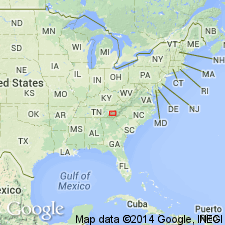
- Usage in publication:
-
- Walden Creek group*
- Modifications:
-
- Named
- Dominant lithology:
-
- Shale
- Siltstone
- Conglomerate
- Sandstone
- AAPG geologic province:
-
- Appalachian basin
- Piedmont-Blue Ridge province
Summary:
Named as a group in Ocoee series. Named for Walden Creek, western tributary of West Fork of Little Pigeon River, Sevier Co., eastern TN. Consists of rocks previously mapped as Wilhite slate, Citico conglomerate (abandoned), and Pigeon slate, all of Keith (1985), as well as Hiwassee slate of Keith (1904). Walden Creek group consists of Licklog formation (new), Shields formation (new), Wilhite formation (revised), and Sandsuck formation (revised). Underlies southeast slope of Chilhowee Mountain and northern foothill belt. Crops out in a belt between a few miles and 8 mi wide in northwesternmost foothills of Great Smoky Mountains; extends along strike further northeast and southwest. Consists of shale and siltstone, discontinuous bodies of conglomerate and sandstone, and minor layers of quartzite, limestone, and dolomite. Best defined sequence is south of English Mountain in eastern part of foothills where an 800 ft section is exposed and formations within the group are defined. Overlain by Cochran formation of Chilhowee group and is adjoined on the south by and probably overlies the Snowbird group (new) of the Ocoee series. Age is later Precambrian.
Source: GNU records (USGS DDS-6; Reston GNULEX).
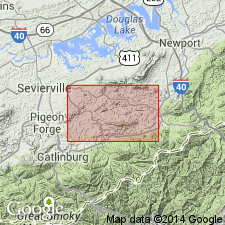
- Usage in publication:
-
- Walden Creek group*
- Modifications:
-
- Overview
- AAPG geologic province:
-
- Appalachian basin
Summary:
In this map area, Walden Creek group of Ocoee series consists of Licklog formation, Shields formation (with its unnamed conglomerate of Shields Mountain and slate of Richardson Cove), Wilhite formation (with its Dixon Mountain and Yellow Breeches members), and Sandsuck formation (with three unnamed members). Because of wide lithologic variation, complex and abrupt facies changes, numerous faults, and complex folds, the sequence, designations, and correlations given here, while consistent with known facts, must be regarded as tentative. Late Precambrian age assignment of Walden Creek is dependent on lithologic correlation made across a major thrust fault. In his unpublished report on Mount Guyot quad, A. Keith applied the names Hiwassee slate to fine-grained rocks and Citico conglomerate to coarse-grained rocks for what is here called Walden Creek group; these names have no stratigraphic significance in this area, were derived from geographic features many miles to the southwest, and are not used in this report. Report includes geologic map, cross sections, correlation chart, and measured sections.
Source: GNU records (USGS DDS-6; Reston GNULEX).
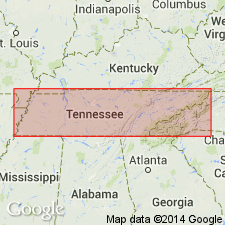
- Usage in publication:
-
- Walden Creek Group
- Modifications:
-
- Overview
- AAPG geologic province:
-
- Appalachian basin
Summary:
In Great Smoky Mountain, Precambrian Walden Creek Group of Ocoee Supergroup includes Licklog, Shields, Wilhite, and Sandsuck Formations.
Source: GNU records (USGS DDS-6; Reston GNULEX).
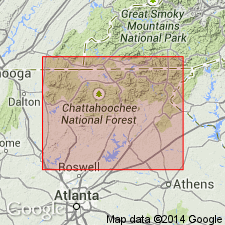
- Usage in publication:
-
- Walden Creek Group
- Modifications:
-
- Areal extent
- AAPG geologic province:
-
- Appalachian basin
Summary:
Geographically extended to GA from TN [although title of article states that this area is Georgia Piedmont and Blue Ridge, it is actually in the AAPG Appalachian basin part of GA]. Based on correlation of rocks east of Great Smoky fault with Sandsuck formation by Salisbury (1961) and mapping of Sandsuck and Wilhite in same structural block between the Conasauga and Ocoee Rivers by Sutton (unpublished data). Both Salisbury's and Sutton's areas lie within the Walden Creek Group shown by King (1964) and Hadley (1970). Therefore, as shown by figures 1 and 2 of this report, Walden Creek Group is extended into northwest GA.
Source: GNU records (USGS DDS-6; Reston GNULEX).
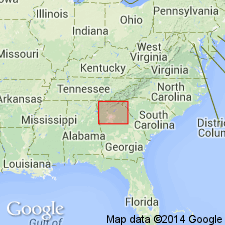
- Usage in publication:
-
- Walden Creek Group*
- Modifications:
-
- Revised
- Areal extent
- AAPG geologic province:
-
- Appalachian basin
- Piedmont-Blue Ridge province
Summary:
Extended into northern GA. The Ocoee series is here revised as Ocoee Supergroup, of which Walden Creek Group is a member. Walden Creek is undivided.
Source: GNU records (USGS DDS-6; Reston GNULEX).
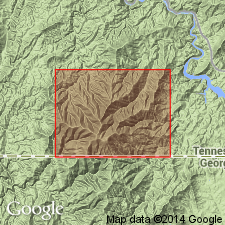
- Usage in publication:
-
- Walden Creek Group*
- Modifications:
-
- Age modified
- AAPG geologic province:
-
- Appalachian basin
Summary:
Age of Ocoee Supergroup changed to Proterozoic Y and (or) Proterozoic Z [Middle and (or) Late Proterozoic]. [Age of Walden Creek Group is Proterozoic Z (Late Proterozoic).]
Source: GNU records (USGS DDS-6; Reston GNULEX).
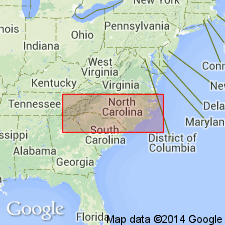
- Usage in publication:
-
- Walden Creek Group
- Modifications:
-
- Overview
- AAPG geologic province:
-
- Piedmont-Blue Ridge province
Summary:
In Blue Ridge belt, Late Proterozoic Walden Creek Group of Ocoee Supergroup is mapped undivided except for Sandsuck Formation, which is separately mapped.
Source: GNU records (USGS DDS-6; Reston GNULEX).
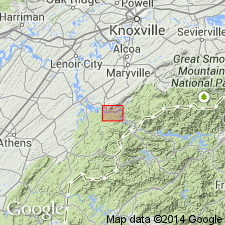
- Usage in publication:
-
- Walden Creek Group
- Modifications:
-
- Age modified
- Biostratigraphic dating
- AAPG geologic province:
-
- Appalachian basin
Summary:
A newly discovered fossil assemblage in the Wilhite Formation, including trilobite, ostracode, bryozoan, and microcrinoid fragments and agglutinated foraminifers prove a Silurian or younger age for the Walden Creek Group of the Ocoee Supergroup. Deposition in a "successor" basin suggested by authors. The shale overlying the Wilhite Formation in the area south of English Mountain cannot be correlated with the Sandsuck Formation underlying the Chilhowee Group on Chilhowee Mountain and English Mountain. The name Sandsuck should not be used for this uppermost unit of the Walden Creek Group.
Source: GNU records (USGS DDS-6; Reston GNULEX).
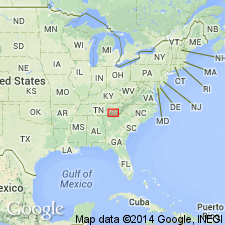
- Usage in publication:
-
- Walden Creek Group
- Modifications:
-
- Overview
- AAPG geologic province:
-
- Appalachian basin
Summary:
"Rediscovery of large, C-shaped soft-bodied metazoan fossils in the Sandsuck Formation in sequence with fossiliferous Chilhowee Group rocks suggests that the Sandsuck is no younger than Early Cambrian, and may still be Late Proterozoic."
Source: GNU records (USGS DDS-6; Reston GNULEX).
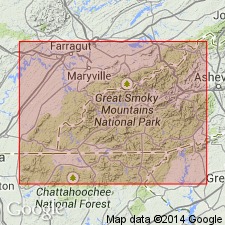
- Usage in publication:
-
- Walden Creek Group
- Modifications:
-
- Geochronologic dating
- AAPG geologic province:
-
- Piedmont-Blue Ridge province
Summary:
K-Ar whole rock ages were obtained from rocks of the Wilhite Formation exposed on U.S. Hwy 129 east of Tallassee, TN. Of the five samples collected here, three have ages of approximately 480 Ma and the other two have ages of 430 Ma. This is the same location from which Unrug and Unrug (1990) reported finding middle Paleozoic microfossils.
Source: GNU records (USGS DDS-6; Reston GNULEX).
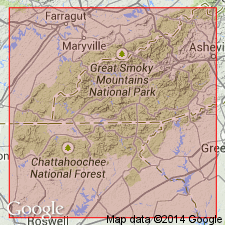
- Usage in publication:
-
- Walden Creek Group
- Modifications:
-
- Overview
- Age modified
- AAPG geologic province:
-
- Piedmont-Blue Ridge province
Summary:
Discovery of shelly fossils in the Wilhite Formation of the Walden Creek Group by Unrug and Unrug (1990) is very important for it means that some of the Ocoee must then be Paleozoic. A Silurian age for the Wilhite, however, has not been proven. Author suggests that fossils here belong to the Tommotian stage, known for its variety of tiny shelly fossils many without descendants.
Source: GNU records (USGS DDS-6; Reston GNULEX).
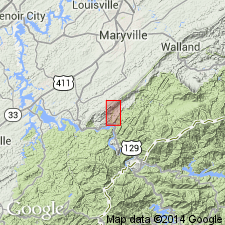
- Usage in publication:
-
- Walden Creek Group
- Modifications:
-
- Biostratigraphic dating
- AAPG geologic province:
-
- Piedmont-Blue Ridge province
Summary:
New microfossil discoveries in the Little Tennessee River Valley indicate age of Walden Creek Group is Late Devonian to earliest Mississippian, and therefore related to the Acadian Orogeny. Fossils have been found along the entire outcrop belt of the Walden Creek Group from Hot Springs, NC, to the Ocoee River Gorge, TN. A conformable contact between the Walden Creek Group and the Great Smoky Group implies that the Great Smoky and possibly the entire Ocoee Supergroup are also Paleozoic. Great Smoky Group is here tentatively correlated with the Lay Dam Formation.
Source: GNU records (USGS DDS-6; Reston GNULEX).
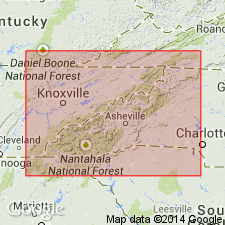
- Usage in publication:
-
- Walden Creek Group
- Modifications:
-
- Biostratigraphic dating
- AAPG geologic province:
-
- Appalachian basin
- Piedmont-Blue Ridge province
Summary:
Upper part of the Ocoee Supergroup (the Shields, Wilhite, and Sandsuck Formations) are assigned to the Vendian (Late Proterozoic), based on occurrences of Vendian acritarchs in the Shields and Wilhite Formations. Authors state that it is beyond the scope of this paper to address the relative merits of the arguments presented by Unrug and Unrug (1990) or comment as to the validity of their studies. Walker and Driese maintain that the Sandsuck, Wilhite, and Shield Formations of the Walden Creek Group form a continuous stratigraphic sequence with the overlying Chilhowee Group, which is dated here as Late Proterozoic and Early Cambrian on the basis of an assemblage of trace and body fossils --PALAEOPHYCUS, PLANOLITES, and SKOLITHOS.
Source: GNU records (USGS DDS-6; Reston GNULEX).
For more information, please contact Nancy Stamm, Geologic Names Committee Secretary.
Asterisk (*) indicates published by U.S. Geological Survey authors.
"No current usage" (†) implies that a name has been abandoned or has fallen into disuse. Former usage and, if known, replacement name given in parentheses ( ).
Slash (/) indicates name conflicts with nomenclatural guidelines (CSN, 1933; ACSN, 1961, 1970; NACSN, 1983, 2005, 2021). May be explained within brackets ([ ]).

